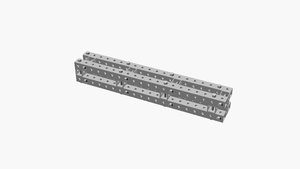Space frames: Difference between revisions
From
No edit summary |
No edit summary |
||
| Line 1: | Line 1: | ||
{{Techniques infobox | {{Techniques infobox | ||
|image | |image = Truss-craftsman.scad.png | ||
|designer | |designer = Phil and RJ Jergenson | ||
|date | |date = | ||
|vitamins = | |vitamins = | ||
|materials = | |materials = | ||
|transformations = | |transformations = | ||
|lifecycles = | |lifecycles = | ||
|parts | |parts = [[Frames]], [[Nuts]], [[Bolts]], [[End caps]] | ||
|techniques | |techniques = [[Bolting]], [[Triangles]] | ||
|tools | |tools = [[Wrenches]] | ||
|git | |git = | ||
|stl | |stl = | ||
}} | }} | ||
Revision as of 11:11, 26 May 2021
Technique: Space frames
| Tools: | Wrenches |
|---|---|
| Parts: | Frames, Nuts, Bolts, End caps |
| Techniques: | Bolting, Triangles |
Introduction
A space frame or space structure (3D truss) is a rigid, lightweight, truss-like structure constructed from interlocking struts in a geometric pattern. Space frames can be used to span large areas with few interior supports. Like the truss, a space frame is strong because of the inherent rigidity of the triangle; flexing loads (bending moments) are transmitted as tension and compression loads along the length of each strut.
Challenges
A triangle is the simplest geometric figure that will not change shape when the lengths of the sides are fixed. In comparison, both the angles and the lengths of a four-sided figure must be fixed for it to retain its shape.
Approaches
-
Simple truss
-
Truss with spacers or stacked washers
-
Truss with tri joints



